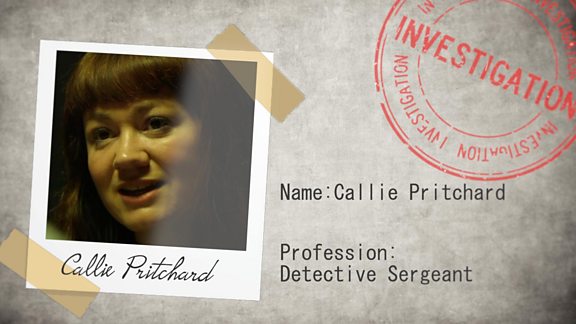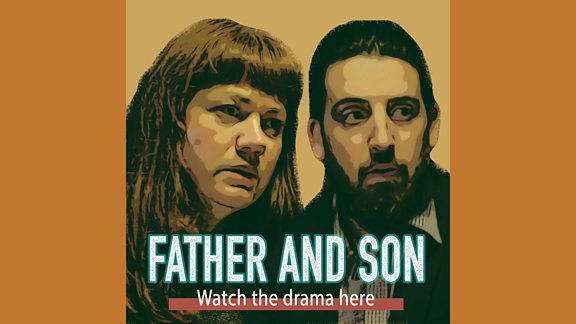Session 11
Watch our new crime drama, Father and Son and then learn more about the people involved with the making of it.
Session 11 score
0 / 0
- 0 / 0Activity 1
- 0 / 0Activity 10
- 0 / 0Activity 2
- 0 / 0Activity 3
- 0 / 0Activity 4
- 0 / 0Activity 5
- 0 / 0Activity 6
- 0 / 0Activity 7
- 0 / 0Activity 8
- 0 / 0Activity 9
Activity 1
Father and Son: Meet Helen!
Helen Belbin plays Detective Inspector Callie Pritchard in our crime drama. Find out about how she became an actor.

Watch the video and complete the activity

So, my name is Helen Belbin and I am playing the character of DS Callie Pritchard.
The vast majority of cases like this end in...
Nothing – I know.
Probably quite late on, because I wanted to be all sorts of other things first including, like, an art teacher and a lawyer – random things like that.
And then when I was, kind of... when I got a bit older into my, kind of, late teens, it was kind of between going to art school or drama school and I kind of very over-simplistically thought, 'Well, I can paint and draw by myself but I can't be in plays or, you know, I can't act by myself.' So, I... yeah, that's why chose drama school.
There have been probably all sorts of roles for all sorts of different reasons, but I was really lucky over the summer – the summer that's just gone. I played Nelly in Wuthering Heights, which is a book that I loved reading when I was a teenager, and she's sort of got a lot of elements that came quite naturally. She's, like, very down to Earth, really strong – like can be quite hard at times, but also very warm.
She's kind of the main narrator in the story. So it's... yeah, it's quite, kind of, tricky jumping in and out of telling the story to the audience and then being part of the scene, and it was outdoors and I got a nice kind of, yeah, proper wench – wenchy outfit. So, yeah it was a really lovely way to spend the summer.
Well, there's usually a certain amount of work that you should really do by yourself, or that you can do by yourself. But I suppose it only really comes to life when you... when you rehearse, when you meet the other actor or actors in the scene, because you can never know how they're going to deliver their lines or, you know, frame their questions and I suppose it's all about what's happening between your character and the other person's character that really makes it interesting.
So, yeah, I think the... it's good to do the work by yourself – I mean, especially on screen work, you really have to – but a really, really satisfying and fun way of working out, kind of, what you're doing with the text to the other person and what they're... yeah, how you're responding to it; that's when it kind of, yeah, starts fizzing and kind of, yeah, you kind of: 'Oh, hang on they're saying that but I don't think that's what they're actually talking about.'
So yeah, that's, I think in... it's only really when, yeah, when you meet the other... the rest of the team and obviously a director can help you with that. Like in theatre, it can take quite a while to work out what... what's really going on between you, and sometimes that can be quite... you know, the play can have been up and running with an audience coming to see it and there'll be just little bits that are like, 'Oh, that's why she's... Oh, I should have...' Yeah, it's quite exciting when... when the penny drops.
I mean that's... that's quite tricky to answer in a way, but you know sometimes when you look at a script and you feel like you're actually not really doing any work, because it's been written how a... how a real person speaks, because we don't just speak in well formed sentences – like, kind of, new thoughts crash in.
And I went to see a play the other night – an amazing play by Caryl Churchill, called A Number – and I thought the actress did... did that really well: just finding the thoughts and sometimes when you... you know, when you see the script you might... you might know that you've got a really long speech, but actually sometimes when we start talking, we don't know how long we're going to talk for. We don't necessarily know what we're going to say and sometimes, when we speak, we're working stuff out as we go.
So, I suppose... yeah, when you read it and you're like, 'Oh, sorry – I think I'm not even acting or working or doing anything,' but it just, kind of, bubbles out of you in a very, kind of, natural way and I suppose it's when it's quite active as well so that you are really engaging with each other.
I hate exposition, so if you... if you're watching a play or if I'm reading a script and the reason that we're saying something is so that the audience understands, I'm just a bit like, 'Grrr!'
You know... I always notice that; it makes me cringe a bit. So, when the, kind of... the history or the back story comes out quite naturally and you just think, 'Oh, those people are communicating and they're discussing this,' but actually you find all this other stuff out about them and you don't notice that it's exposition; I love that. Yeah, there's all sorts of scripts that are, yeah, lovely for all sorts of reasons, I suppose.
I don't think I do in a really obvious way; you know, when people say, like, 'But you're an actress – are you really good at lying?' And I know it sounds really pretentious, but that's not really what you're doing when you're acting. You're not lying; you're trying to find – this sounds very pretentious – but you're trying to find the truth in what... what you're saying.
I think that part of my... I feel that part of one's training, like at drama school or wherever you trained to be an actor, is – I mean, I sort of use a bit of a funny expression for it – but it's making friends with shame. So, it's kind of like you can really embarrass yourself: you can try things in the rehearsal room that really don't work, you can have a bit of a laugh about them, take the mickey out of each other, but you kind of know that life goes on. So, I suppose it gives you – I don't know if it's actual confidence or just the ability to, kind of, exist in uncomfortable spaces.
I mean, some of this probably sounds a bit pretentious but it just means that – like in my personal life, people think that maybe if I'm doing a temp job or something that I'd be really happy to be the centre of attention. I don't like being the centre of attention when it's me. You know, when you got a character that you've worked on, a costume, your hair and make-up done, you've got this amazing script, you... people aren't looking at you; they're looking at, kind of, your work really and what you're putting out there.
So, I suppose there's a sort of... I don't quite know how to describe it; it's not quite confidence, but I know that I can walk into a room and cope with most things that – you know, certain casting rooms are... you're asked to really embarrass yourself, or you might misunderstand an instruction and then really go for something that's not the right thing, and you just find a way of, kind of, having a bit of a laugh and just, yeah, brushing it off to a degree. So, I would say that that might not be an acting skill exactly, but it's something that has, you know, been informed by my training and my experience to a degree.
That's a really difficult question. I have... I suppose I have people where I just think they make really great choices or I would really love their career. Someone like... well, and I actually got an opportunity to meet her: she is a friend of the director of Wuthering Heights that I mentioned before, so she came up to see a show that I was in. She's called Anna Chancellor and she was... I mean, I saw her for... I remember first seeing her in the BBC 1995 adaptation of Pride and Prejudice, which is – though five hours long – I've seen so many times and she plays, like, a really bitchy sort of character in that – quite heightened, quite unpleasant, but she does.... I've seen her be, like... I've seen her in all sorts of things: TV shows, in plays. She's got this amazing kind of gravitas – totally wonderful in real life.
But, yeah, she's... she's brilliantly, sort of, 'Eugh!' in Pride and Prejudice and she sort of... Well, I suppose it's quite bitchy, but it's kind of like: 'Oh, would you take a turn around the room? So refreshing!' Kind of, just... that was a nod towards an impression. But, yeah, just like quite an arch kind of, 'Hmph!' character, yeah. And lovely in real life, which is... yeah, when you meet someone who you look up to, that's always a relief.
